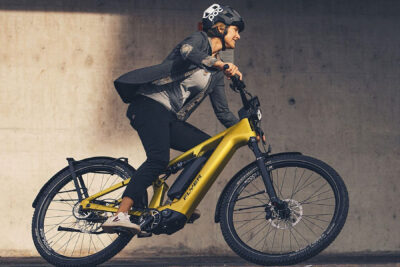EC wants mandatory e-bike insurance
The European Commission has decided that electric bicycles must have a third party liability insurance. While the draft still needs to go through the EU Council and Parliament, it effectively undermines current legislation that equals pedelecs with bicycles.
The decision of the European Commission to require e-bike users to be insured comes in the wake of a review of their Motor Vehicle Insurance Directive. The new draft was to take in new developments such as automated driving initially. In this context, Pedelecs are no more than a footnote but the ruling – if it goes through – could have wide ranging consequences for the industry. Still, it does not come entirely unexpected.
++ The article has been updated to announce the start of a new petition, link at the bottom. ++
In fact the rule that classifies electric bicycles with assistance limited to 25 kph (Pedelec25) and equals them to bicycles has stood on unsecured footing from the start. Strictly speaking and according to UN legislation, bicycles are vehicles, which are propelled by human muscle power alone. Yet, the EU had included pedelecs in bicycle rules, thus freeing them from insurances or type approval as well as allowing them to use bike lanes.
The new proposal though puts them in the category of motorised vehicles with the European Commission claiming that pedal-assisted cycles should already have full motor vehicle insurance. This view most likely has come about with the backing of the insurance industry whose lobbyist are aplenty in Brussels. However, they do have a point – under the current circumstances.
At the moment, legislators classify pedelecs according to motor power in Watt and a speed limit of 25 kph. As the latter is not tied to human muscle power necessarily, risks for accidents involving weaker drivers being too fast can rise indeed. The argument of the EC (and insurance industry) then goes, that riders need to pay for this.
However, this risk could be managed if new classification would position electric bicycles as a category of their own. Organisations like ExtraEnergy, have been calling for such legislation for years. The advocates’ proposal: all e-bikes must be torque sensor controlled so that assistance depends on muscle power. And raise the speed limit to 32 kph for the strongest riders (those with a muscle power of 150 Watt). Such higher speed limit bound to the human input would also make electric bikes a more valid choice for better trained or younger cyclists.
The current idea of the EC however would only stifle a still emerging market that counts among the most successful segments in electric transport. Furthermore, it almost criminalises electric cyclists. Says ECF advocacy director Adam Bodor: “If this proposal becomes a law, third party liability insurance will be required that would discourage millions of European citizens to use an e-bike, undermine the efforts and investments of several member states and the European Union to promote sustainable mobility.”
Note however, that the draft still needs the approval of the council and parliament. Even if it goes through though, member states are free to decide if they may exempt their e-bike riding citizens. The exemption though would still call for the national guarantee funds to potentially reimburse any victims of accidents involving electric bicycles.
Update July, 11: The issue has a global dimension explained in this video. A petition to update U.N. legislation has just been set up and you can find the link below.
bikebiz.com, bike-eu.com, extraenergy.org (proposed legislation), openpetition.de (pedelecs be bicycles petition)





0 Comments